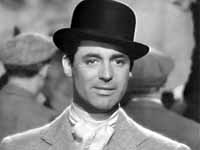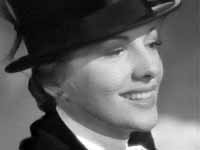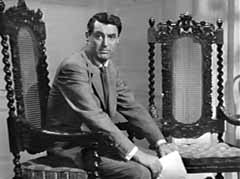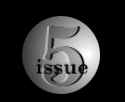|
In the next scene, Johnnie is being photographed with two women, but the male photographer is only interested in Johnnie's image: "Give us one of your smiles, Mr. Aisgarth. " At that moment, Johnnie sees Lina, without glasses and in riding habit, controlling a rearing horse. The camera--and Johnnie--sees Lina's hidden beauty at this moment, transformed by the exhilaration of her own power: "It can't be the same girl." Johnnie continues to view Lina as who she is in this moment, a perception of her that he realizes is unrecognized by all, including Lina and her father, General McLaidlaw. As Johnnie says, "I bet they call you monkey-face."
 
Johnnie sees Lina controlling a rearing horse in Suspicion.
Throughout the rest of the film, Lina's perceptions control the spectator, as she
attempts to control Johnnie. When Johnnie appears at her house, he finds in her book his own image, a picture Lina tore out from the magazine. After they have left for a walk, Lina is seen desperately struggling with Johnnie. The spectators' first impression is that he is attacking her, which turns out to be false: "What did you think I was going to do--kill you? Nothing less than murder would explain such a violent reaction. " Johnnie was merely going to rearrange her hair, because of the unseen possibilities that he perceives in Lina. When Johnnie asks her to compare him to her horse, Lina replies, "I think if I got the bit between your teeth, I would have no trouble handling you." Her belief that handling a man like Johnnie would be easy becomes significant.
Lina at this point sees no possibilities in herself or with Johnnie. But as she returns home, after refusing a date with Johnnie, she overhears her father predicting that she will never marry. To gain control over her life, to escape the house the General does not believe that she can leave, she impulsively and passionately kisses Johnnie. Though she only knows Johnnie as an attractive object, Lina realizes that by possessing this man/object that she can gain a degree of control over her life and her future.
After Johnnie leaves town, Lina continues to be motivated by his photographic images, with another magazine photo giving Lina the impetus to track Johnnie down to invite him to the Hunt Ball. Johnnie makes a late and disruptive entrance, his handsome image drawing a crowd of women to him--but he only has eyes for Lina. Throughout the following courtship sequence, the inexperienced Lina is remarkably in control. As they take her car to her house, Lina professes that she loves Johnnie. Though he admits to sharing her feelings, he knows enough about himself and about her to be afraid. He remarks on her coolness, while saying that he is shaking like a leaf. She replies: "For the first time, I know what I want."
Her self-determination can be seen in her elopement. Instead of being carried away by Johnnie, Lina leaves her house on her own, arriving separately at the registrar's office. But she then allows Johnnie to take her on an extravagant, romantic honeymoon and rent a home for them. Now that she has put the bit between his teeth, she expects him to act like a husband, to live up to the ideal of his photographic image.
However on their return to England, she is surprised to learn that he has no way to pay for the honeymoon or the house: "I don't have a shilling--never have." Her surprise is indicative of Lina's short-sightedness: the first time Lina met Johnnie, he did not have enough money for his trainfare and borrowed change from her. He repeatedly warned her that he was no good, sincere warnings that she brushed aside. Everyone else sees and loves Johnnie for who he is--an open-hearted but irresponsible man. But he has chosen to love a woman who does not understand him and expects him to conform to her image of a man, an image that causes him to suffer. She is a Mc-Laid-law, expecting Johnnie to conform to patriarchal expectations. Lina calls Johnnie a child, but Johnnie is the realistic one.

Johnnie checks out General McLaidlaw's
wedding present in Suspicion.
Johnnie continues to suffer under Lina's refusal to see and accept him. Johnnie's discomfort with the expections laid out by Lina, and reinforced by General McLaidlaw, is represented by Johnnie's relationship to gifts from the General. Instead of providing the newlyweds with support, the General's wedding gift is two ornate chairs. Lina is delighted by the chairs, signifying her family tradition and structure. Johnnie finds the chairs ugly and uncomfortable, appearing dwarfed and childlike (diminished as a man) when he sits in them. Johnnie sells the chairs at his first opportunity, which upsets Lina so much that he embezzles to get them back for her. The General's "gift" to the couple serves only to illustrate the inadequacies of the groom.
Johnnie's failure as a man in the McLaidlaw's eyes is further evidenced by the General's bequeathing of his portrait to Lina and Johnnie--and nothing else. Again, Johnnie is asked to live with a symbol of his failure as Lina's husband, under the constantly disapproving eyes of his father-in-law. Throughout the rest of the film, Johnnie is watched suspiciously by Lina and her father's portrait. These suspicious eyes push Johnnie farther away from Lina, which only makes her suspect him more. Lina's inability to see the suffering of her husband, to see him as anything but a glittering, romantic object, almost costs both of their lives. Not only does Suspicion shift the alignment of the camera's active, desiring gaze from a male to female perspective, it also places the female character in the traditionally male position of the sadistic voyeur, with the male character, our dear Cary, in the role of the masochistic victim of the gaze.
page 3 of 6
 
|






